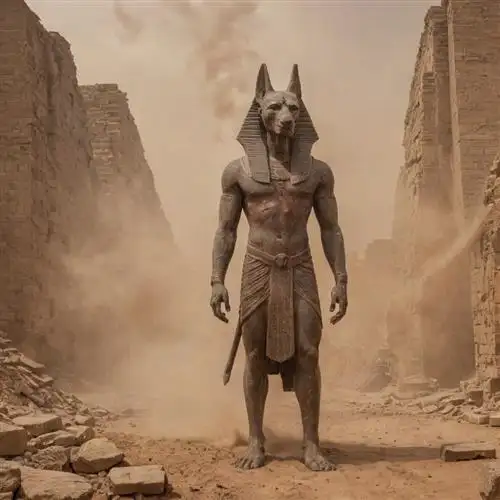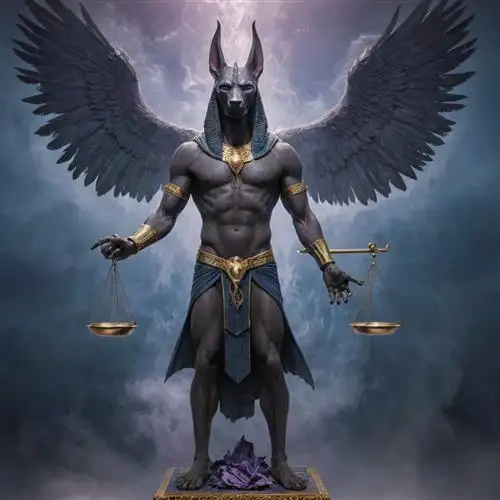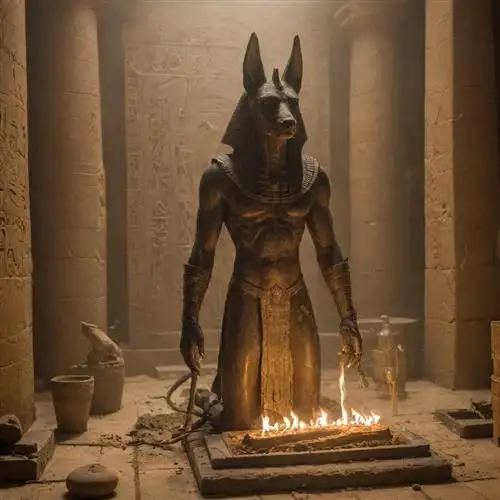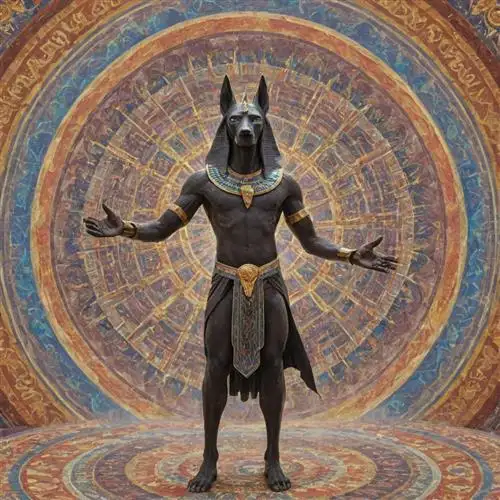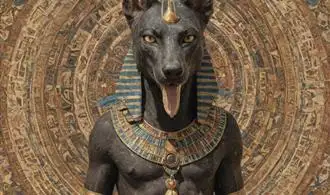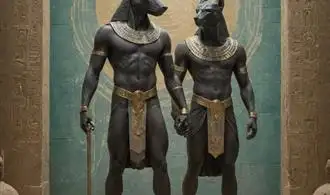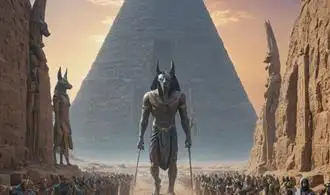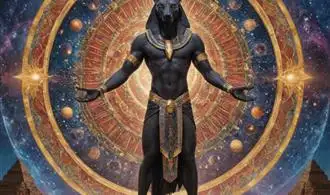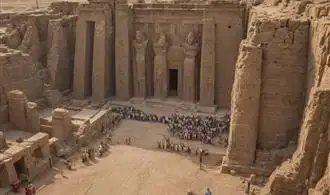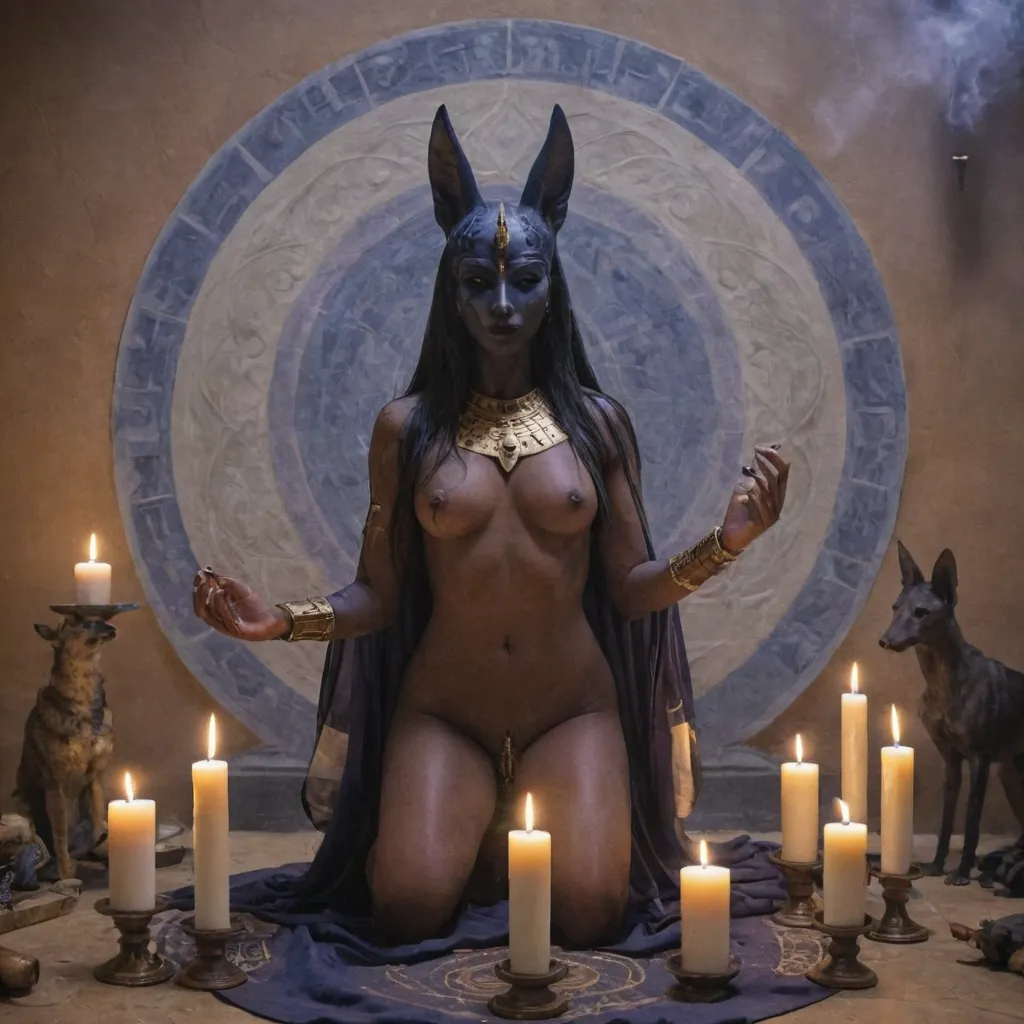
The Ancient Egyptian God Anubis
The Ancient Egyptian God Anubis is a profound and multifaceted figure whose significance extends far beyond the confines of ancient mythology. As the god of the dead and the protector of the afterlife, Anubis was a central deity in the complex religious and cultural fabric of ancient Egypt. His role was integral to the essential rituals and beliefs surrounding death, burial, and the journey into the afterlife.
Anubis was depicted with the head of a jackal or a black dog, a representation that held deep symbolic meaning. The jackal, known for its association with the deserts and cemeteries, was believed to be a guide for the dead, leading them safely through the treacherous terrain of the underworld. The black color of Anubis' body was also symbolic, representing the color of the fertile soil along the Nile River, which was seen as a metaphor for the regeneration and rebirth that occurred in the afterlife.
One of Anubis' primary responsibilities was the embalming and mummification of the deceased. He was believed to oversee the meticulous process of preserving the body, ensuring the soul's successful transition into the afterlife. This sacred duty was not only a practical necessity but also a deeply spiritual one, as the preservation of the physical form was crucial for the deceased's continued existence in the next world.
Additionally, Anubis was responsible for weighing the heart of the deceased against the feather of Ma'at, the goddess of truth and justice. This critical ritual, known as the "Weighing of the Heart," determined the fate of the soul. If the heart was found to be pure and free from sin, the individual was granted passage to the afterlife; if the heart was deemed impure, it would be devoured by the devouring monster Ammit, condemning the soul to oblivion.
The Symbolism of Anubis
Anubis, the jackal-headed Egyptian deity, is a figure of immense significance in ancient Egyptian mythology and spirituality. As the god associated with mummification, the afterlife, and the protection of the dead, Anubis' symbolism encompasses deep and multifaceted layers of meaning. Understanding the symbolism of Anubis can provide valuable insights into the beliefs, practices, and worldview of the ancient Egyptians, as well as offer profound personal insights for those seeking to connect with this powerful archetypal figure.
At the core of Anubis' symbolism is his role as the guide and guardian of the dead. As the deity responsible for the embalming and mummification process, Anubis was believed to oversee the delicate transition of the deceased from the physical realm to the afterlife. This symbolism represents the transformative power of death, the sacred rites of passage, and the importance of honoring the dead with reverence and care.
Anubis' jackal-headed form is also deeply symbolic, representing both the duality of life and death, as well as the qualities of loyalty, protection, and discernment. The jackal was a creature that inhabited the desert and was often associated with the transition between the world of the living and the realm of the dead. In this way, Anubis embodied the liminal space between the two realms, serving as a psychopomp – a guide for the souls of the departed.
Additionally, Anubis' symbolism encompasses the concept of judgment and the weighing of the heart. In the ancient Egyptian afterlife, the heart of the deceased was weighed against the feather of Ma'at, the goddess of truth and justice. Anubis was responsible for overseeing this crucial moment, ensuring that the soul's deeds and intentions were properly assessed before granting them passage into the afterlife.
The symbolism of Anubis also extends to the realm of personal transformation and spiritual growth. As a deity associated with death and rebirth, Anubis can be seen as a guide for individuals undergoing profound personal changes, challenges, or initiations. By embracing the lessons and insights offered by Anubis, one can cultivate a deeper understanding of the cyclical nature of life, the importance of self-reflection, and the transformative power of facing one's own mortality.
Anubis and the Egyptian Mummification Process
Anubis, the jackal-headed Egyptian deity, played a pivotal role in the ancient practice of mummification. This intricate process, which aimed to preserve the deceased's physical body for the afterlife, was heavily influenced by Anubis's guidance and oversight. Understanding the significance of Anubis in the mummification ritual provides valuable insight into the spiritual beliefs and practices of ancient Egypt.
Anubis was the patron deity of the embalming process, overseeing the crucial steps that transformed the mortal body into a vessel for the soul's continued journey. As the god of the dead, Anubis was responsible for guiding the deceased through the complex rituals, ensuring their successful transition to the afterlife. The ancient Egyptians believed that Anubis's presence and blessings were essential to the mummification process, granting the deceased protection and facilitating their transformation.
The mummification process itself was a meticulous and intricate task, requiring the expertise of specialized priests and embalmers. Anubis's role was central to this procedure, which typically involved the following key steps:
- Removal of internal organs: Anubis was believed to be responsible for the removal of the deceased's internal organs, which were then placed in canopic jars and preserved separately.
- Desiccation and wrapping: Under Anubis's guidance, the body was dried using natron, a naturally occurring salt, and then carefully wrapped in linen bandages.
- Placement of amulets and talismans: Anubis oversaw the placement of various amulets and talismans within the wrappings, which were believed to provide protection and aid the deceased in the afterlife.
- Final rites and burial: Anubis, as the god of the dead, presided over the final rites and burial ceremonies, ensuring the deceased's safe passage to the afterlife.
The connection between Anubis and the mummification process went beyond the physical aspects of the ritual. Anubis was also believed to be the guardian of the deceased's soul, responsible for weighing the heart of the dead against the feather of truth, a crucial step in the judgment process. This belief further solidified Anubis's role as a central figure in the ancient Egyptian conception of the afterlife and the preservation of the individual's essence beyond physical death.
Connecting with Anubis for Spiritual Growth
Anubis, the ancient Egyptian god of the afterlife, death, and the underworld, holds profound significance for those seeking spiritual growth and transformation. As the guardian of the dead, Anubis offers guidance and support for individuals embarking on their own journey of self-discovery and enlightenment.
One of the key ways to connect with Anubis for spiritual growth is through meditation and ritual practice. By incorporating Anubis-focused meditations into your daily routine, you can tap into the energy and wisdom of this powerful deity. These practices may involve visualizations, chanting, or offering prayers and offerings to Anubis. As you deepen your connection with Anubis, you may find that your intuition and psychic abilities become more pronounced, allowing you to navigate the realms of the subconscious and the afterlife with greater clarity.
Another important aspect of connecting with Anubis for spiritual growth is the exploration of the concept of death and transformation. Anubis, as the god of the afterlife, is closely associated with the process of death and rebirth. By contemplating the teachings of Anubis, you can gain a deeper understanding of the cyclical nature of life and the importance of embracing change and transformation. This can lead to a more profound appreciation for the impermanence of existence and the opportunity for personal growth that arises from the ending of one phase and the beginning of another.
Furthermore, Anubis can serve as a powerful guide and protector during your spiritual journey. By invoking the energy and blessings of Anubis, you can receive guidance, protection, and support as you navigate the challenges and obstacles that may arise on your path of spiritual growth. This can include protection from negative energies, assistance in overcoming personal fears and limitations, and the facilitation of transformative experiences that propel your spiritual evolution.
Anubis in Modern Witchcraft and Paganism
Anubis, the ancient Egyptian jackal-headed god, has long been revered as a powerful figure in the realm of the occult. In modern witchcraft and paganism, his influence and symbolism have gained a renewed significance, offering practitioners a profound connection to the mysteries of death, transformation, and the afterlife.
One of the key aspects of Anubis' role in contemporary spiritual practices is his association with the transition between life and death. As the god who presided over the mummification process and guided the dead through the underworld, Anubis is seen as a guardian and protector of the soul's journey. Many modern witches and pagans invoke Anubis during rituals and meditations focused on personal growth, spiritual awakening, and the acceptance of mortality.
In the context of witchcraft, Anubis is often revered as a deity of protection, psychopomp (a guide of souls), and initiation. Practitioners may work with Anubis to cleanse and purify their energy, to confront and overcome fears related to death and the unknown, and to facilitate deep transformations within their spiritual practice. The imagery of the jackal-headed god is commonly used in altar setups, tarot decks, and other occult paraphernalia to connect with Anubis' powerful energies.
Pagan traditions, such as Kemetic Orthodoxy and other Egyptian-influenced paths, often incorporate Anubis as a central figure in their cosmology and rituals. These traditions may focus on honoring Anubis through offerings, invocations, and the exploration of his mythological narratives. Devotees may seek Anubis' guidance in matters of the underworld, the afterlife, and the mysteries of death and rebirth.
Furthermore, Anubis' association with embalming and the mummification process has led to his incorporation into practices involving the preservation of the self, both physically and spiritually. Some modern witches and pagans may work with Anubis to engage in rituals of self-mummification, where they explore the symbolic and metaphorical aspects of this ancient Egyptian funerary rite as a means of personal transformation and spiritual evolution.

